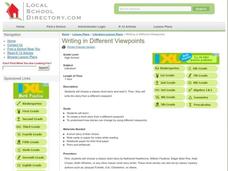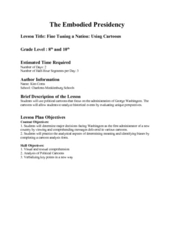Curated OER
Writing in Different Viewpoints
Students read and analyze the point of view of a selected classic short story. They take notes while reading the story, select a character, and rewrite the story from a different viewpoint.
Curated OER
What Is an "Inquiry Lesson"?
Students complete inquiry projects. In this historical perspectives lesson plan, students conduct their own research on topical historical questions their instructors suggest. Students then locate historical evidence and analyze it to...
Curated OER
Six Day War
Learn about the diverse perspectives involved in the Six Day War by having learners examine and annotate presidential speeches given by the three nations—Egypt, Israel, and the United States—at the heart of the conflict and producing...
Curated OER
Applying KWL Guides to Sources with Elementary Students
What is a KWL chart? Here is a well thought-out lesson that has learners use KWL charts to gain historical perspective. Your class examines primary sources about historical events and identifies what they know, want to know, and,...
Curated OER
Stop Action and Assess Alternatives
Young scholars stop action and determine how history may have been altered. In this historical perspectives lesson plan, students consider how the Cherokee Removal, the Transcontinental Railroad, the Immigration Act of 1924, and the...
ReadWriteThink
Teaching Point of View With Two Bad Ants
What better way to explain the concept of point of view than from an ant's perspective! After reading Two Bad Ants, pupils identify the point of view of the ants by studying the text and pictures. Then, they fill out a chart that...
Curated OER
Find The Hidden Message: Media Literacy in Primary Grades
Learners practice listening to and reading various types of media and text. In groups, learners use video, newspapers, magazines, and more to compare and contrast different types of information. They identify the differences between fact...
North Carolina Consortium for Middle East Studies
The French and Indian War: The War That Shaped America’s Destiny
How would a Frenchman, Englishman, and Native American have each viewed the French and Indian War? Your young historians will learn about their unique perspectives and the war as a whole through a role-playing activity, engaging...
Curated OER
Fort Life in the Green Bay Area, 1816-1841
Ninth graders examine from the perspectives of military personnel, Native Americans, families of soldiers, and civilians who lived and worked in the region during the era. They create a 2-page scrapbook layout from at least two of the...
Curated OER
I Am Not a Crook
Students use video, Internet research and discussion to consider the presidency of Richard Nixon. They obtain information from multiple perspectives and form an opinion of how Richard Nixon should be remembered.
Curated OER
Press Review
How can word choice affect a political speech? Middle and high schoolers examine the text of the 1999 State of the Union Address, and then determine how newspaper articles and television reports describe and analyze the event. Use this...
National WWII Museum
Dr. Seuss and WWII
What famous children's author and illustrator created World War II political cartoons featuring such subjects as fascism, the war effort, discrimination, and the dangers of isolationism? The who in this story is Dr. Seuss, and what...
University of Pennsylvania
Decoding Propaganda: J’Accuse…! vs. J’Accuse…!
Reading snail mail is a great way to go back into history and to understand others' points of view. The resource, the second in a five-part unit, covers the Dreyfus Affair. Scholars, working in two different groups, read one letter and...
National Endowment for the Humanities
Dostoevsky's Crime and Punishment
Pain and suffering do not have to be inevitable in a study of Crime and Punishment. A carefully scaffolded lesson plan introduces readers to the divided natures of the characters in Fyodor Dostoevsky's complex novel. Groups use the...
Curated OER
Approaching the Iraq War
Students identify the justifications for the war in Iraq as seen from teh American and Middle Eastern perspectives. They research personal, primary and secondary sources to create a constructed poster board perspective. The poster board...
Idaho State Department of Education
Lessons for Social Studies Educators
Point of view, purpose, and tone: three concepts readers of primary and secondary source materials must take into account when examining documents. Class members view a PowerPoint presentation and use the SOAPS strategy to identify an...
Curated OER
Gender, Sex, and Slavery
While examining slavery's impact on women, historians compare and contrast the perspectives of a plantation mistress and an enslaved woman, both reflecting on the system of forced prostitution. Text analysis and written responses create...
Curated OER
News Journalism Across the Media: Introduction
Although students are aware of news as information that influences their perceptions of the world, they are often unaware of the various ways to present that information. Encourage them to investigate, discuss, analyze and make valuable...
Curated OER
Plant Diversity and Distribution
Students construct a defined plot on school grounds and observed patterns in plant life. They count trees, shrubs, cacti and record on a data sheet. They compare data and generate a plant diversity overlook for their school.
Curated OER
Cold War Conflict in Vietnam: The Vietnam-Era Presidency
Comparing and evaluating various media types is a great way to build critical analysis skills. Learners read about the Vietnam era presidency, specifically the foreign policy established by Johnson and Nixon. Then they compare several...
National Endowment for the Humanities
Chronicling America: Uncovering a World at War
As part of a study of World War I, class members read newspaper articles from the time that urge American involvement, non-involvement, or neutrality. Using the provided worksheet, groups analyze the articles noting the central argument...
Curated OER
Re-Viewpoints From 2002
Students explore how editorials use various devices to convey a message to a reader. They select key news topics from 2002 and write their own editorials.
Curated OER
Lesson One: The Three Perspectives on Native American Removal
Eleventh graders explore the impact of the Indian Removal Act. In this US History lesson, 11th graders analyze primary resources.
Curated OER
Fine Tuning a Nation: Using Cartoons
Students examine political cartoons to gain an understanding of the political issues that George Washington faced. In this historical perspectives lesson, students analyze political cartoons about the National Bank, the title presidents,...

























